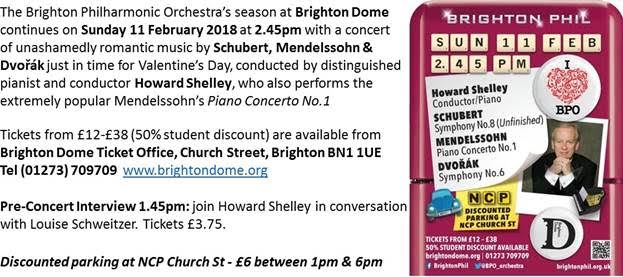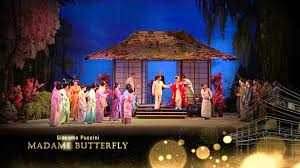On Sunday 11 February the Brighton Philharmonic Orchestra will be performing a concert of unashamedly romantic music to get everyone in the mood for Valentine’s Day, and we are delighted to welcome Howard Shelley back to Brighton as both conductor and pianist. (Regular audience members will recall that on his last visit to the Dome with the Brighton Phil two years ago, performing Shostakovich’s Piano Concerto No.2, he created quite a stir by directing the orchestra from the piano using a digital score on an iPad with a Bluetooth foot pedal.)
This time he opens proceedings with Schubert’s enchanting “Unfinished” Symphony No.8. Schubert started composing it in 1822 but put it aside to concentrate on other works, leaving it unfinished at his death six years later. We are left with two remarkable movements that herald the dawn of the Romantic symphony.
Mendelssohn wrote his First Piano Concerto aged just 21 on a trip to Italy (at the same time as composing his “Italian” Symphony) and its urgent, irrepressible opening seethes with the dynamism of impetuous youth. Franz Liszt famously played it at sight in a piano showroom, before going on to perform it many times in public to great acclaim. One of the great vehicles for the piano virtuoso, it is the perfect showcase for the dazzling technique that has made Howard Shelley one of the country’s truly great artists.
Our concert ends with Dvo?ák’s Symphony No.6 – full of rich melodies, lively rhythms and vivid orchestral colour, incorporating the folk music of his native Bohemia (now the Czech Republic) within a classical Romantic form. Premiered in 1881, this lush and confident work contributed greatly towards establishing him as one of the foremost composers of his generation, and provides a fitting conclusion for a programme that charts the evolution of the Romantic symphony.
Tickets (from £12-£38) are available from Brighton Dome Ticket Office in Church Road, in person, by telephone (01273) 709709, or online at: www.brightondome.org
50% discount for students and under 18s.
Discounted parking for BPO concert ticket-holders (just £6 between 1 & 6pm) is available at NCP Church Street Car Park.


